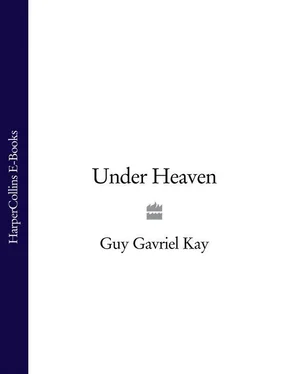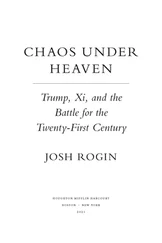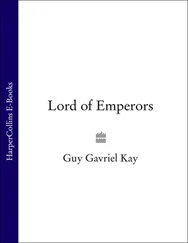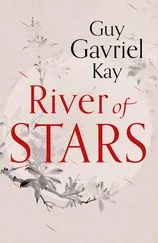Men changed during wars or conflict, sometimes beyond recognition. Tai had seen it in himself, on the steppes beyond the Long Wall among the nomads. Men changed, not always in ways you liked to recall, though courage seen was worth remembering.
He didn’t think Bytsan would grow savage, but he didn’t know. And he could easily imagine the opposite about some of the Tagurans who had come here through two years, arriving armoured and armed, as if to the stern drums of a battlefield, not bringing supplies to a solitary fool.
They were not simple, easily sorted encounters, the ones he had with the warriors of the Empire of the Plateau when they came down to him.
It was Bytsan he saw, as the Tagurans reached the meadow and began circling the lake. The captain trotted his bay-coloured Sardian horse forward. The animal was magnificent, breathtaking. They all were, those far-western horses. The captain had the only one in his company. Heavenly Horses they called them in Tai’s own land. Legends said that they sweated blood.
The Tagurans traded for them with Sardia, beyond where the divided Silk Roads became one again in the west, after the deserts. There, through yet more harsh mountain passes, lay the deep, lush breeding grounds of these horses, and Tai’s people longed for them with a passion that had influenced imperial policy, warfare, and poetry for centuries.
Horses mattered, a great deal. They were why the emperor, Serene Lord of the Five Directions and the Five Holy Mountains, was steadily engaged with the Bogü nomads, supporting chosen leaders among the kumiss -drinking yurt-dwellers north of the Wall, in exchange for a supply of their horses, however inferior they might be to the ones from Sardia. Neither the loess-laden soil in northern Kitai nor the jungles and rice-lands of the south would permit the grazing and breeding of horses of any real quality.
It was a Kitan tragedy, had been for a thousand years.
Many things came to Xinan along the guarded Silk Roads in this Ninth Dynasty, making it wealthy beyond description, but horses from Sardia were not among them. They could not endure that long desert journey. Women came east, musicians and dancers. Jade and alabaster and gems came, amber, aromatics, powdered rhinoceros horn for the alchemists. Talking birds, spices and food, swords and ivory and so much else, but not the Heavenly Horses.
So Kitai had had to find other ways to get the best mounts they could—because you could win a war with cavalry, all else being equal, and when the Tagurans had too many of these horses (being at peace with the Sardians now, trading with them) all else was not equal.
Tai bowed twice in greeting as Bytsan reined up—right fist in left palm. He had acquaintances—and an older brother—who would have judged it a humiliation had they seen him bow so formally to a Taguran. On the other hand, they hadn’t had their lives guarded and preserved by this man and the steady arrival of supplies every full moon for almost two years.
Bytsan’s blue tattoos showed in the sunlight, on both cheeks and the left side of his neck above the collar of his tunic. He dismounted, bowed, also twice, closed fist in palm, adopting the Kitan gesture.
He smiled briefly. “Before you ask, yes, I brought wine.”
He spoke Kitan, most Tagurans did. It was the language of trade in all directions now, when men were not killing each other. It was believed, in Kitai, that the gods spoke Kitan in the nine heavens, had taught it to the original Father of Emperors as he stood, head bowed on Dragon Mountain in the past-that-lay-behind.
“You knew I would ask?” Tai felt rueful, a little exposed.
“Longer twilights. What else can a man do? The cup is a companion, we sing. It goes well?”
“It goes well. The moonlight kept me awake, I am slow to begin this morning.”
They knew his routine, the query had not been idle.
“Just the moon?”
Tai’s own people asked variants of that question every time they came. Curiosity—and fear. Very brave men, including this one, had told him directly they could not have done what he was doing here, with the dead unburied, and angry.
Tai nodded. “The moon. And some memories.”
He glanced past the captain and saw a young, fully armoured soldier ride up. Not one of the ones he knew. This man did not dismount, stared down at Tai. He had only one tattoo, wore an unnecessary helmet, did not smile.
“Gnam, take an axe from by the cabin, help Adar chop firewood.”
“Why?”
Tai blinked. He looked at the Taguran captain.
Bytsan’s expression did not change, nor did he glance back at the soldier on the horse behind him. “Because that is what we do here. And because if you do not I will take your horse and weapons, remove your boots, and let you walk back through all the passes alone among the mountain cats.”
It was said quietly. There was a silence. Tai realized, with a kind of dismay, how unaccustomed he’d become to such exchanges, a sudden tension rising. This is the way the world is , he told himself. Learn it again. Start now. This is what you will find when you return.
Casually, so as not to shame the captain or the young soldier, he turned and looked across the lake towards the birds. Grey herons, terns, a golden eagle very high.
The young man—he was big, well-made—was still on his horse. He said, “This one cannot chop wood?”
“I believe he can, since he has been digging graves for our dead for two years now.”
“Ours, or his own? While he despoils our soldiers’ bones?”
Bytsan laughed.
Tai turned quickly back, he couldn’t help himself. He felt something returning after a long time. He knew it for what it was: anger had been a part of him, too readily, as far back as he could remember. A second brother’s portion? Some might say that was it.
He said, as levelly as he could, “I should be grateful if you’d look around and tell me which of the bones here is one of yours, if I should feel inclined to despoil it.”
A different silence. There were many kinds of stillness, Tai thought, inconsequentially.
“Gnam, you are a great fool. Get the axe and chop wood. Do it now.”
This time Bytsan did look at his soldier, and this time the other man swung himself down—not hurrying, but not disobeying, either. The bullock had pulled the cart up. There were four other men. Tai knew three of them, exchanged nods with those.
The one called Adar, wearing a belted, dark-red tunic over loose brown trousers, no armour, walked with Gnam towards the cabin, leading their horses. The others, knowing their routine here, guided the cart forward and began unloading supplies into the cabin. They moved briskly, they always did. Unload, stack, do whatever else, including cleaning out the small stable, get back up the slope and away.
The fear of being here after dark.
“Careful with his wine!” Bytsan called. “I don’t want to hear a Kitan weeping. The sound’s too unpleasant.”
Tai smiled crookedly, the soldiers laughed.
The chunk of axes came from the side of the cabin, carrying in mountain air. Bytsan gestured. Tai walked off with him. They stepped through tall grass, over bones and around them. Tai avoided a skull, instinct by now.
Butterflies were everywhere, all colours, and grasshoppers startled at their feet, springing high and away in all directions. They heard the drone of bees among the meadow flowers. Here and there the metal of a rusted blade could be seen, even on the grey sand at the water’s edge. You needed to be careful where you stepped. There were pink stones in the sand. The birds were raucous, wheeling and swooping, breaking the surface of the lake for fish.
“Water’s still cold?” Bytsan asked after a moment.
Читать дальше












